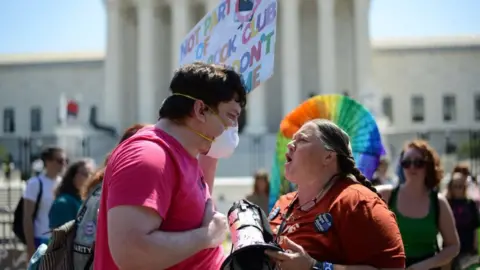Mifepristone ruling: The abortion battle may be just be beginning

 Getty Images
Getty ImagesLess than a year after its landmark decision reversing constitutional abortion protections, a majority of the nine justices of the US Supreme Court seem reluctant to jump back into the politically charged subject anytime soon.
The court was reviewing a decision by a federal judge in Texas that suspended approval by the Food and Drug Administration (FDA) of the abortion drug mifepristone, one of the most commonly used methods of terminating a pregnancy in America.
The court threw out that decision, as well as a ruling by a federal appeals court that would have limited use of the drug to women less than seven weeks pregnant, and required three in-person physician visits for those seeking the drug, and prevented its availability by post.
Access to mifepristone remains unchanged.
The court's ruling was short and to the point. The current rules governing mifepristone remain in effect until the Supreme Court eventually does decide on the merits of the original Texas order, or (less likely) lets whatever the appeals court decides stand without review.
This effectively kicks the can down the road months and possibly well into 2024, when a final court decision could come down in the shadow of the next presidential election.
Two justices, Clarence Thomas and Samuel Alito, openly dissented from the majority. The latter went into detail on why he would have let the Fifth Circuit's appeal court's ruling stand.
He wrote that the circuit court's stay would not have caused "irreparable harm" to the FDA or to Danco Laboratories, which manufactures the drug.
Neither Mr Alito nor the majority decision expressed any opinion about mifepristone's ultimate fate. Given the conservative-leaning court's abortion ruling last year, however, its final decision in the case could very well anger the abortion-rights groups that on Friday were celebrating.
The case is now back in the hands of the Fifth Circuit appeals court, where six of its 16 judges were appointed by Donald Trump and only four by Democratic presidents.
Last week, two Trump-selected judges on that court issued a lengthy opinion that, among other things, said it was "unlikely" that the challenge to at least some of the FDA's decisions authorising mifepristone would fail. A third judge (appointed by former Republican President George W Bush) disagreed.
Those three judges will hear oral arguments in the case in May and could issue a decision weeks or even months later. That ruling could then be reviewed by the full 15-judge circuit before the losing side has the opportunity to appeal to the US Supreme Court.
There is a likelihood that when this case once again lands on the steps of the high court, it will do so with a ruling that curtails the availability of the abortion drug.
Even that, however, could be just the beginning.
This current legal battle is just over a temporary hold on the FDA's mifepristone approval. Once this round of appeals has concluded, the case will head back to the Texas court for a trial on the merits of the case, possibly with witness testimony.
After that court issues its final decision, the appeals process will start all over again.
Meanwhile, the opinion of the general public continues to land heavily in favour of existing policies relating to the abortion pill. A recent Ipsos poll found 68% of Americans opposed overturning approval of the abortion drug versus only 28% in favour. Republican voters were split, with 53% in favour and 46% opposed.
A majority of Americans view the Supreme Court sceptically when it comes to abortion, with 57% saying the chamber is politically motivated on the topic, while only 37% trust that the justices will remain "neutral and impartial".
Friday's order may allow some of those emotions, and attitudes towards the court, to cool in the coming months. But the court's abortion ruling last June has opened the door to numerous legal challenges to state-level abortion rights and restrictions, as well as to federal policies like the mifepristone rules.
Mr Alito, in his opinion last June, wrote that "it is time to heed the Constitution and return the issue of abortion to the people's elected representatives", but this is far from the last time the nine justices will have to weigh in on the matter.
